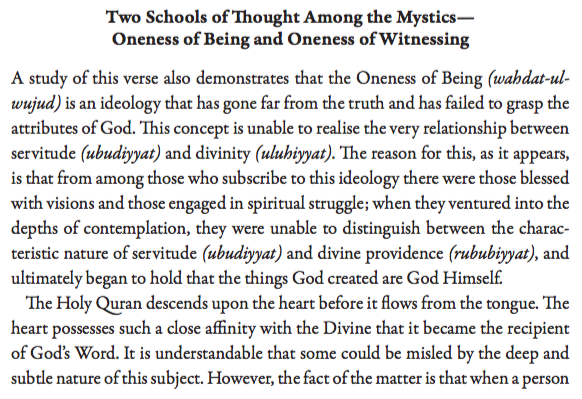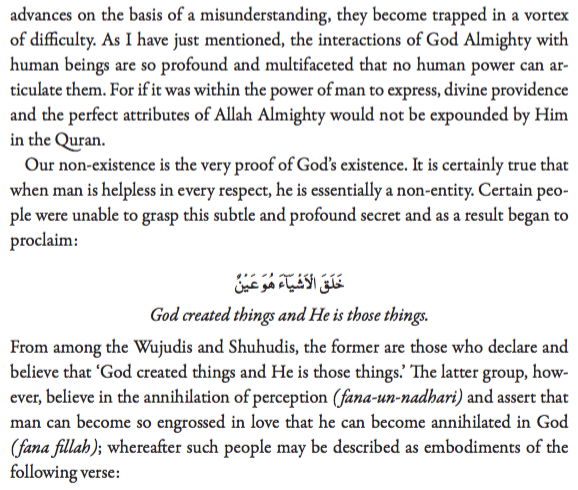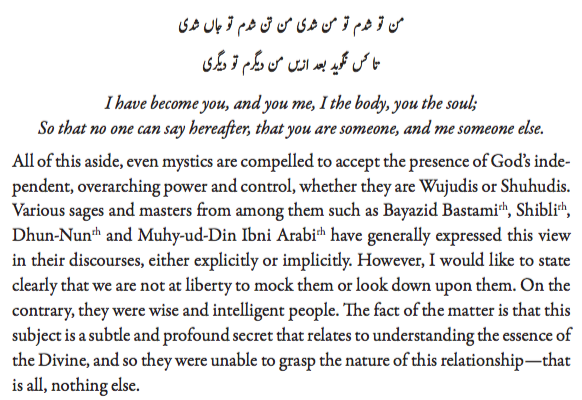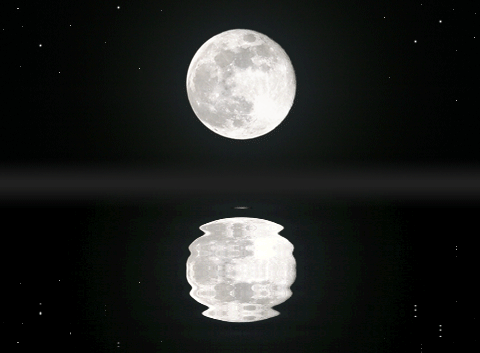بسم اللہ الرحمٰن الرحیم
The Promised Messiahas explains about two schools of thought among the Sufis in regards to God:
- Oneness of Being (واحدة الوجود Wahdat-ul-wujud)
- Oneness of Witnessing (واحدة الشھود Wahdat-ush-shuhud)
Wahdat-ul-wujud means “oneness of being”, or that the things God created are God Himself.
Wahdat-ush-shuhud refers to the fact that God and his creation are entirely separate.




Malfuzat Vol. 1. pg. 111-113

Keeping in view what the Promised Messiahas has said, one can understand the bases of Sufi writings and not be deviated, but at the same time enjoy the profound implications of some of the Sufi poetry…. like the one given below.
Everything in the universe reflects God’s attributes, but it does not mean those things themselves become God. For example, the moon is reflected on water, but it seems as if the moon is in the water. In reality, the moon is moon and water is water, but it seems the moon has descended in the water. The interplay of water and the moon creates a beautiful relationship between the lowly and the high (and the ever-fluctuating and the Unchanged).
وَلِلَّـهِ الْمَشْرِقُ وَالْمَغْرِبُ ۚ فَأَيْنَمَا تُوَلُّوا فَثَمَّ وَجْهُ اللَّـهِ ۚ إِنَّ اللَّـهَ وَاسِعٌ عَلِيمٌ
Unto Allah belong the East and the West, and whithersoever ye turn, there is Allah’s Countenance. Lo! Allah is All-Embracing, All-Knowing. (The Holy Qur;an 2:116)
Abida Parveen – Yaar Ko Hamne Ja Baja Dekha
Written by: Hazrat Shah Niyaz
Lyrics and Translation below
Manum Maanay Azmandi K Be Tonay Yaazdaanran
Ghum-e-choon To Naaz Ni Ni
Ghum-e-choon To Naaz Ni Ni Behizaar Naaz-daran
Kohe-e- Afataab-e-chashman Wa Jamaal Toos To Roshan
Ager Astobazgeeram Bad Bay Chashm-e-raazgaaran
I am needful person, who needs you
I will take for granted very dearly the sorrow of a beloved like you
You are the sun; my eye is alight with your beauty
if I give up you, to whom will I go
Yaar ko hamne ja ba ja dekha,
Kahin zaahir kahin chhupa dekha.
I saw my beloved in all I saw,
At times revealed, hidden at times.
Nukta-e-imaan se waaqif ho,
Chehra-e-yaar ja ba ja dekha.
Been familiar with the issue of faith,
I saw the face of my beloved in all I saw.
Kahin mumkin hua kahin waajib,
Kahin faani kahin baqa dekha.
At times a possibility, at times imperative,
At times ephemeral, at times eternal.
Deed apne ki thi use khwahish,
Aap ko har tarah bana dekha.
Inspired by the wish to see Himself,
He made Himself into every form.
Dekhta aap hai sune hai aap,
Na koi uska ma siwa dekha.
He is the one who sees and hears
I saw no one other then Him.
Soorat-e-gul mein khilkhila ke hansa,
Shakl-e-bulbul mein chahchaha dekha.
Laughed gleefully through blooming flowers,
Crooned in nightingale’s melodious songs.
Shama ho kar ke aur parwana,
Aap ko aap mein jala dekha.
He took the forms of the candle and the moth,
And annihilated Himself in flames of His own.
Kar ke daawa kahin anal haq ka,
Bar sare daar wo khincha dekha.
At times claiming “I am the Truth”,
Witnessed his head raised on the Cross.
Tha woh bartar shuma-o-ma se ‘Niyaz’,
Phir wohi ab shuma-o-ma dekha.
O ‘Niyaz’ He was beyond the bounds of `You’ and `Me’,
And yet I see Him in every `You’ and `Me’.
Kahin begaanavash nazar aaya,
Kahin surat se aashna dekha.
At times he behaved like unfamiliar,
At timed I found him familiar with the face.
Kahin hai badshah-e-takht nashin,
Kahin kaasa liye gada dekha.
At times he is the emperor in power,
At times seen with a mendicant’s begging bowl.
Kahin aabid banaa kahin zahid,
Kahin rindon ka peshwa dekha.
At times, a devout worshipper,
Lord of rakes and drunkards at times.
Kahin woh dar libaas-e-mashooqaan,
Bar sare naaz aur ada dekha,
At times in the beloved’s attire,
He was seen throwing up His charms.
Kahin aashiq ‘Niyaz’ ki soorat,
Seena biryaan-o-dil jala dekha.
At times as a lover like ‘Niyaz’,
He was seen beating his breast and heart aflame.